

 After months of negotiating in bad faith, Bay Area Rapid Transit (BART) management Thursday night left BART workers no other option but to go on strike. What a shame. It didn’t have to come to this.
After months of negotiating in bad faith, Bay Area Rapid Transit (BART) management Thursday night left BART workers no other option but to go on strike. What a shame. It didn’t have to come to this.
With all the misinformation swirling about on the BART strike, there are a few things to clear up.
Here are the three things you need to know about the BART strike (h/t to Pete Castelli of SEIU 1021):
1) The strike is NOT about wages or benefits. BART workers made concession after concession on the economic proposals with the goal of averting a strike. BART workers and management agreed to a deal yesterday on wages, health care and pensions.
2) BART management pulled the rug out from under workers at the last minute by insisting on new workplace rules that infringed on the rights of workers.
» Read more about: Three Important Facts About the BART Strike »


(Labor 411, the group dedicated to promoting products and services that carry the union label, offers a couple of spooky recipes for Halloween treats that are reposted below.)
According to a recent survey, more Americans than ever will be getting in the Halloween spirit this year. Halloween has now become one of the fastest growing and most widely loved holidays in America. We here at Labor 411 love Halloween because it’s all about the candy — and so much of it is union made! You can get a complete list of union-made candy by clicking here.
Sometimes buying union candy can be confusing, mostly to do with what we call “bridge companies,” which can make some of their products both in the U.S. and out of the country. So if a company is listed in our directory but you’ve heard they make candy out of the country,


Poulinna Po had just walked into the Long Beach offices of Khmer Girls in Action when she got the news: Governor Jerry Brown had vetoed Assembly Bill 1263, which promised to expand the number of state medical translators. The measure had seemed to offer a straightforward solution to the dilemmas faced by California’s estimated three million Medi-Cal beneficiaries who speak little or no English when they talk to Anglophone doctors or medical staff.
One tragic example of this kind of patient-doctor miscommunication occurred in 2008 at Los Angeles County General hospital, when a pregnant Maria Guevara, who only spoke Spanish, was prescribed an abortion-inducing drug — which she then took, believing it to be part of her prenatal care. She lost her baby.
“That lack of communication between the doctor and me has changed my life forever, ” Guevara would later bitterly recount.


 When the town of Sandy Springs, Georgia, spun-off from Fulton County and established a brand new government, it didn’t sign a Declaration of Independence; it signed a contract.
When the town of Sandy Springs, Georgia, spun-off from Fulton County and established a brand new government, it didn’t sign a Declaration of Independence; it signed a contract.
The 100,000-person town entered into a five-year contract with the for-profit management company CH2M Hill to operate almost all of the town’s services: running trash collection, and street cleaning, and wastewater management, and even security and administration for the courthouse. A for-profit company, rather than public officials and public employees, would be in charge of providing all “public” services except for fire and police departments. CH2M Hill employees, wearing Sandy Spring uniforms and driving trucks with Sandy Spring logos, even enforced municipal ordinances like grass-cutting and parking regulations.
Sandy Springs, an affluent suburb of Atlanta — home to Herman Cain, professional sports players, and the woman who voiced iPhone’s Siri — had been fighting for years to spin-off from Fulton County,
» Read more about: How CH2M Hill Is Outsourcing the Future »


In times of national crises, thoughtful journalists often hit the history books to find precedents and analogies.
Here’s a tip from a retired newspaper scribe turned history teacher: Look no farther than late 1860 and early 1861 to find historical parallels to our current crisis.
One hundred and fifty three autumns ago, our nation elected our first Republican president, Abraham Lincoln. Last fall, we re-elected our first African American president, Democrat Barack Obama.
The white, mostly Democratic, slave state South had an almost pathological hatred for Lincoln and his anti-slavery party.
Before the voters went to the polls on November 6, 1860, Southern politicians and newspaper editors warned that the slave states would secede if Lincoln won. (Eleven of 15 did; Kentucky, my home state, and Lincoln’s, did not.)
Today, many, if not most, House Republicans, and more than a few GOP senators, hate Obama to the point that they are willing to push the country into default and risk wrecking the economy over the Affordable Care Act,


(Note: Ari Berman’s post first appeared on The Nation and is republished with permission.)
 In its 2013 decision in Arizona v. The Inter Tribal Council of Arizona, the Supreme Court ruled 7-2 that Arizona’s proof of citizenship law for voter registration violated the 1993 National Voter Registration Act (NVRA).
In its 2013 decision in Arizona v. The Inter Tribal Council of Arizona, the Supreme Court ruled 7-2 that Arizona’s proof of citizenship law for voter registration violated the 1993 National Voter Registration Act (NVRA).
In 2004, Arizona voters approved Proposition 200, a stringent anti-immigration law that included provisions requiring proof of citizenship to register to vote and government-issued photo ID to cast a ballot. Last year, the US Court of Appeals for the Ninth Circuit blocked the proof of citizenship requirement, which it said violated the NVRA. Under the 1993 act, which drastically expanded voter access by allowing registration at public facilities like the DMV, those using a federal form to register to vote must affirm,


Now is the time to lance the boil of Republican extremism once and for all. Since Barack Obama became president, the extremists who have taken over the Republican Party have escalated their demands every time he’s caved, using the entire government of the United States as their bargaining chit.
In 2010 he agreed to extend all of the Bush tax cuts through the end of 2012. Were they satisfied? Of course not.
In the summer of 2011, goaded by an influx of Tea Partiers, they demanded huge spending cuts in return for raising the debt ceiling. In response, the President offered an overly-generous $4 trillion “Grand Bargain,” including cuts in Social Security and Medicare and whopping cuts in domestic spending (bringing it to its lowest level as a share of gross domestic product in over half a century).
Were Republicans content? No. When they demanded more,
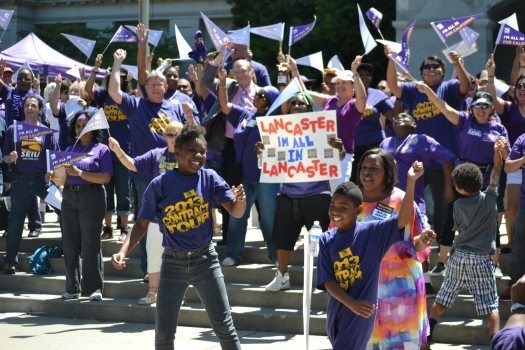

It’s easy to be pessimistic about the future these days. Tea Party extremists are threatening to push our federal government into default. Federal immigration reform is on the back burner until the shutdown and debt ceiling messes are sorted out. In a host of states, anti-worker governors are hell-bent on gutting workers’ rights while giving more power to corporate special interests.
But in California, a decidedly different story is playing out. The end of the legislative session here brought huge gains to workers and their families that boost our state’s economy and bolster the middle class.
With the federal minimum wage stuck at $7.25, Governor Brown signed AB 10, taking California’s minimum wage to $10 per hour by January of 2016, a 25 percent wage increase for low-wage workers in the state. While immigration reform is stalled in D.C., Governor Brown signed a slew of bills to protect immigrants and ensure greater inclusion.
» Read more about: It Was a Very Good Year: California Labor Looks Back »


The latest chapter in the efforts to dismantle California’s public-sector retirement system was officially opened Tuesday when San Jose Mayor Chuck Reed submitted paperwork that begins the process of qualifying his latest pension initiative for next year’s statewide ballot.
The filing brings to a climax weeks of speculation about the timing of the proposed law after Frying Pan News first confirmed rumors of its existence when Gary Cohn published a leaked draft version last month and when we reported Reed’s remarks, delivered before a Hoover Institution conference on pensions, that indicated he was uncertain whether he would file for the 2014 or 2016 ballot. Now Reed is certain: It’s 2014 or never.
Called the Pension Reform Act of 2014, the measure seeks to rewrite California’s constitution in order to bypass its current guarantees of public pension rights. If passed by voters,
» Read more about: There Will Be Blood: Chuck Reed Files Pension-Cutting Ballot Initiative »


A spirited group of community, religious and labor activists gathered outside a Western Avenue McDonald’s today to connect their efforts to raise fast-food workers’ earnings with a new study disclosing how dependent such low-income employees are on public assistance.
Among the facts of low-income life that were dug up by the University of California, Berkeley Labor Center report:
“We’ve seen McDonald’s clown the workers and we’ve seen Ronald McDonald – did you like that?” the Reverend Lewis Logan asked at the top of the rally.
» Read more about: McDonald’s Rally Echoes UC Berkeley Fast-Food Study »
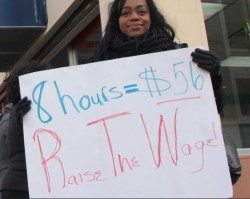

 A new study released today by the University of California, Berkeley Labor Center estimates that taxpayers contribute around $7 billion annually to provide basic social service benefits and health care to families of America’s expanding ranks of low-wage fast-food workers. The study, Fast Food, Poverty Wages: The Public Cost of Low-Wage Jobs in the Fast-Food Industry, also found that:
A new study released today by the University of California, Berkeley Labor Center estimates that taxpayers contribute around $7 billion annually to provide basic social service benefits and health care to families of America’s expanding ranks of low-wage fast-food workers. The study, Fast Food, Poverty Wages: The Public Cost of Low-Wage Jobs in the Fast-Food Industry, also found that:
» Read more about: Report: Fast-Food Workers Have One Foot in Poverty »
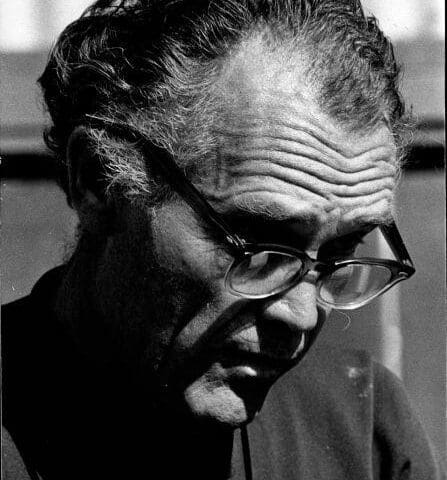

California State Senator (and former United Farm Workers activist) Bill Monning is sponsoring an effort on behalf of a broad coalition of activists and legislators urging Governor Jerry Brown to nominate Fred Ross Sr. for the California Hall of Fame. Ross, who mentored Cesar Chavez, Dolores Huerta, Eliseo Medina and multiple generations of great activists, was arguably the leading community organizer of his time. Although Ross died in 1992, his influence over current Latino voter outreach and labor organizing strategies remains strong. A national campaign began earlier this year to get President Obama to award him the posthumous Presidential Medal of Freedom.
Fred Ross Sr. spent 60 years in California working to bring social and economic justice. But he is not in the state’s Sacramento-based Hall of Fame, an omission that Senator Monning and others now hope Governor Brown will remedy.
On September 6, 2013, Monning, along with Senate leader Darrell Steinberg and many of their Senate colleagues,
» Read more about: Fred Ross Sr., California Hall of Fame Candidate »


 Investigative reporter Gary Cohen recently appeared on radio station KPFK’s David Feldman Show to discuss the strange liaison between the Pew Charitable Trusts and the libertarian Laura and John Arnold Foundation. Cohn had written a piece for Frying Pan News linking the respected research organization with the public-pension-cutting agenda of John Arnold, a billionaire hedge-funder. Cohn also broke a story about a proposed state ballot initiative that would change California’s constitution in favor of gutting the retirement plans of state and municipal employees.
Investigative reporter Gary Cohen recently appeared on radio station KPFK’s David Feldman Show to discuss the strange liaison between the Pew Charitable Trusts and the libertarian Laura and John Arnold Foundation. Cohn had written a piece for Frying Pan News linking the respected research organization with the public-pension-cutting agenda of John Arnold, a billionaire hedge-funder. Cohn also broke a story about a proposed state ballot initiative that would change California’s constitution in favor of gutting the retirement plans of state and municipal employees.
Listen here to a segment of Feldman’s show for a quick rundown of the Pew-Arnold alliance and what’s behind the move to cut funding for public pensions.
» Read more about: Radio: Gary Cohn Explains Pew-Arnold Alliance »


 Governor Jerry Brown has included AB 1263, the Medical Interpreters Bill, in a group of bills passed by the California legislature that he vetoed. As Frying Pan News’ Gary Cohn wrote August 20, “Day after day, non-English speaking patients are seeing doctors and nurses throughout California without the aid of medical interpreters, sometimes with tragic results.”
Governor Jerry Brown has included AB 1263, the Medical Interpreters Bill, in a group of bills passed by the California legislature that he vetoed. As Frying Pan News’ Gary Cohn wrote August 20, “Day after day, non-English speaking patients are seeing doctors and nurses throughout California without the aid of medical interpreters, sometimes with tragic results.”
Cohn’s article highlighted stories in which Californians lacking fluency in English received harmful or unintended medical advice, or who were kept in the dark on the medical conditions of loved ones. AB 1263, authored by Assembly Speaker John A. Pérez (D-Los Angeles), would have spent $200,000 to gain access to $270 million in Affordable Care Act funds to create about 7,000 interpreter jobs within 10 years.
The governor vetoed the measure Sunday, commenting, according to the Sacramento Bee, that “California has embarked on an unprecedented expansion to add more than a million people to our Medi-Cal program.
» Read more about: Governor Vetoes Medical Interpreters Bill »
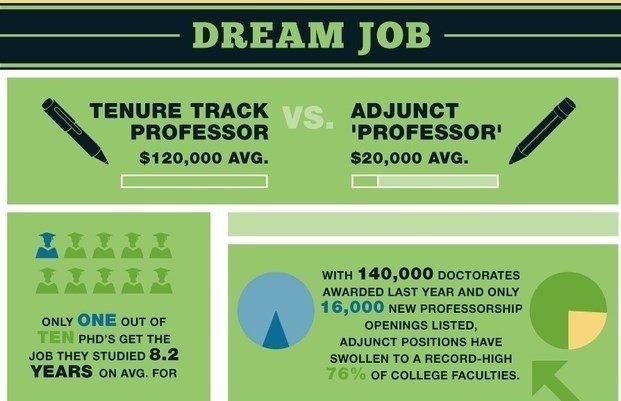
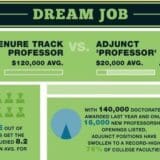
(See full infographic at OnlinePhdPrograms)
Driving a 15-year-old car 70 miles a day between three different college campuses took a toll on my ride – and on me. I was teaching as adjunct professor at three different L.A. community colleges. An adjunct is a part-time professor who is hired on a contractual basis rather than being given tenure and a permanent position. Many universities hire large numbers of adjunct faculty members because they are flexible and cheaper to maintain than traditional full-time faculty members.
I had no health insurance, no savings and no other financial resources, so every penny went to rent, car repairs and food. I was expected to hold office hours, but the colleges where I taught did not provide office space for adjuncts – I had nowhere to meet students or grade papers on campus.
» Read more about: Adjunct Faculty: Straddling the Poverty Line »


One by one, like guests at a late party
They shake our hands and step into the dark:
Arabian ostrich; Long-eared kit fox; Mysterious starling.
One by one, like sheep counted to close our eyes,
They leap the fence and disappear into the woods:
Atlas bear; Passenger pigeon; North Island laughing owl;
Great auk; Dodo; Eastern wapiti; Badlands bighorn sheep.
One by one, like grade school friends,
They move away and fade out of memory:
Portuguese ibex; Blue buck; Auroch; Oregon bison;
Spanish imperial eagle; Japanese wolf; Hawksbill
Sea turtle; Cape lion; Heath hen; Raiatea thrush.
One by one, like children at a fire drill,


 The New York Post reported that congressional gyms are staying open despite the government shutdown that, so far, has gone into its second week.
The New York Post reported that congressional gyms are staying open despite the government shutdown that, so far, has gone into its second week.
Andy Soltis of the Post wrote,
The taxpayer-subsidized gyms for members of Congress remain open despite the government shutdown.
The members have to rough it, though — going without trainers or attendants to provide fresh towels and other amenities.
The liberal organization Think Progress said Tuesday that the order to keep the House gym open came directly from Speaker John Boehner’s office.
The House gym — largely unknown to outsiders until Anthony Weiner took infamous photos of himself in the locker room in 2011 — has no sign on the door and members have to be buzzed in.
This exclusive health club in Washington D.C., which is subsidized by taxpayer dollars,
» Read more about: Capitol Dumbells: Congress’s Gym-Dandy Shutdown Perk »


 It is widely reported that the Republicans are looking for a face-saving way to back down from the standoff they created on the budget and the debt ceiling. According to these news accounts, this route could involve another stab at the “grand bargain,” a deal that includes some tax increases and cuts to Social Security and Medicare.
It is widely reported that the Republicans are looking for a face-saving way to back down from the standoff they created on the budget and the debt ceiling. According to these news accounts, this route could involve another stab at the “grand bargain,” a deal that includes some tax increases and cuts to Social Security and Medicare.
This prospect should inspire outrage beyond the fact that it would make the Republicans huge winners coming from a disastrous losing position. (Polls show that shutting down the government to keep people from getting health care is not a popular position.) That’s an issue for political junkies; the more important point is that millions of seniors who are already struggling would be asked to make further sacrifices for basically no reason whatsoever.
What is not in dispute right now is that most seniors are not doing very well. The median income for a person over age 65 is less than $20,000 a year.
» Read more about: Will Seniors Lose in a ‘Grand Bargain’? »


“Frankly, I’m surprised that American jobs are so controversial.”
These words, spoken by Los Angeles Alliance for a New Economy (LAANE) senior researcher Linda Nguyen-Perez, hung in the air of a Chicago hotel conference room last week during the American Public Transportation Association (APTA) Annual Meeting.
Linda and I attended the conference on behalf of the new Jobs to Move America campaign, explaining our effort to transit agency officials, consultants and transportation equipment manufacturers from across the nation. The budding coalition behind this movement unites community, small business, labor, faith, small business, philanthropy, academic and environmental groups, including LAANE, all of whom want to maximize the 5.4 billion American taxpayer dollars that public transportation agencies spend every year, to improve transportation systems, create good American jobs and generate opportunities for such struggling unemployed American workers as veterans, single parents and residents of low-income neighborhoods.
» Read more about: Are American Manufacturers Afraid of American Jobs? »


Whether BART [Bay Area Rapid Transit] closes down this week will come down to one issue and one issue only: whether the BART Board of Directors shows leadership or continues to act to hold Bay Area transit riders hostage by using the same playbook a small minority of elected officials in Washington, D.C. have used to close down our federal government.
No one in the Bay Area—whether they ride BART or not—wants to see a BART strike. This is especially true of BART workers, who live in one of the most expensive regions in the world and do not receive a paycheck while they are on strike.
To demonstrate their commitment to reaching a deal before a cooling-off period expires tonight, BART workers have put a proposal on the table that is fair and affordable and incentivizes BART workers to keep the system one of the nation’s best.
» Read more about: BART Directors Must Act to Avert Midnight Strike »